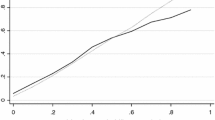Abstract
This paper uses an analysis of betting decisions made in offcourse betting offices in the UK to explore differences between the nature of male and female betting behaviour. Specifically gender differences in levels of performance, propensity for risk taking and levels of confidence in betting decisions are considered. The results provide some evidence for greater risk propensity amongst male bettors, lower levels of female bettor confidence in their choices and some degree of performance advantage for women bettors. The results are discussed in relation to previous research; some of the apparent discrepancies are explained in terms of differences in motivational focus and gender differences in definitions of risk-taking and ‘successful’ performance. In this context areas for future research are highlighted.
Similar content being viewed by others
References
Anderson, G. & Brown, R.I.F. (1984). Real and laboratory gambling, sensation-seeking and arousal.British Journal of Psychology, 75, 401–10.
Arenson, S.J. (1978). Age and sex differences in the probability preferences of children.Psychological Reports, 43, 697–698.
Asch, P., Malkiel, B.G. & Quandt, R.E. (1984). Market efficiency in racetrack betting.Journal of Business 57, 165–174.
Baker, T. (1975). Sex differences in social behaviour. In Berkowitz, L.,A survey of social psychology. Hinsdale, Illinois: Dryden Press.
Berry, M.C. (1980). Targeting more aid to women entrepreneurs.Venture, May, 294–304.
Bolton, R.N. & Chapman R.G. (1986). Searching for positive returns at the track: A multinomial logit model for handicapping horse races.Management Science, 32(8), 1040–1060.
Bruce, A.C. & Johnson, J.E.V. (1992). Toward an explanation of betting as a leisure pursuit.Leisure Studies, 11, 201–218.
Ceci, S.J. & Liker, J.K. (1986). A day at the races: a study of IQ expertise and cognitive complexity.Journal of Experimental Psychology, 115(3), 255–266.
Coet, L.J. & McDermott, P.J. (1979). Sex, instructional set, and group make up: Organismic and situational factors influencing risk-taking.Psychological Reports, 44, 1283–1294.
Dickerson, M.G. (1979). F.I. schedules and persistence at gambling in the UK betting office.Journal of Applied Behavioural Analysis, 12, 315–23.
Eagly, A. (1978). Sex differences in influenceability.Psychological Bulletin, 85, 86–116.
Estes, R. & Hosseini, J. (1988). The gender gap on Wall Street: An empirical analysis of confidence in investment decision making.The Journal of Psychology, 122, 577–590.
Herschel, R., Wynne, B. & Noel, T. (1991).The Impact of Group Gender Composition on Group Performance in an Electronic Meeting Setting: A Study of Group Gender Composition. NATO Advanced Study Institute, Lucca, Italy.
Hudgens, G.A. & Fatkin, L.T. (1985). Sex differences in risk taking: repeated sessions on a computer-simulated task.The Journal of Psychology, 119, 197–206.
Kass, N. (1964). Risk in decision making as a function of age, sex and probability preferences.Child Development, 35, 577–582.
Keinan, G., Meir, E. & Gome-Nemirovsky, T. (1984). Measurement of risk takers' personality.Psychological Reports, 55, 163–167.
Kelly, J.A., Wildman, H.E. & Uney, J.R. (1982). Gender and sex-role differences in group decision making social interactions: A behavioural analysis.Journal of Applied Social Psychology, 12(2), 112–127.
Levin, I.P., Snyder, M.A. & Chapman, D.P. (1988). The interaction of experiential and situational factors and gender in a simulated risky decision-making task.The Journal of Psychology, 122(2), 173–181.
Lindgren, H.E., Youngs Jr, G.A., McDonald, T.D., Klenow, D.J. & Schriner, E.C. (1987). The impact of gender on gambling attitudes and behavior.Journal of Gambling Behavior, 3, 155–167.
Masters, R. & Meier, R. (1988). Sex differences and risk taking propensity of entrepreneurs.Journal of Small Business Management, January, 31–35.
Nicholson, N. & West, M. (1988).Managerial job changes: Men and women in transition. Cambridge: Cambridge University Press.
Priest, R.F. & Hunsaker, P.L. (1969). Compensating for a female disadvantage in problem solving.Journal of Experimental Research in Personality, 4, 57–64.
Slovic, P. (1966). Risk taking in children.Child Development, 37, 169–176.
Wagenaar, W.A. (1988).Paradoxes of gambling behaviour. Hove, UK: Lawrence Erlbaum Associates.
Worchel, S. & Cooper, J. (1976).Understanding social psychology. Homeword, Illinois: Dorsey.
Author information
Authors and Affiliations
Additional information
The research reported here was made possible by grants from Ladbroke Racing and the cooperation of Ladbrokes and Vetabet. Special thanks to Philip Cooper for his statistical advice and to the insightful comments of the anonymous referees on an earlier draft of this paper.
Rights and permissions
About this article
Cite this article
Bruce, A.C., Johnson, J.E.V. Male and female betting behaviour: New perspectives. J Gambling Stud 10, 183–198 (1994). https://doi.org/10.1007/BF02109939
Issue Date:
DOI: https://doi.org/10.1007/BF02109939



